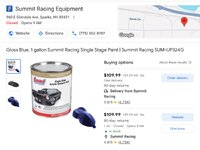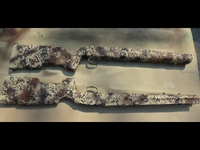Navigation
Install the app
How to install the app on iOS
Follow along with the video below to see how to install our site as a web app on your home screen.
Note: This feature may not be available in some browsers.
More options
Style variation
You are using an out of date browser. It may not display this or other websites correctly.
You should upgrade or use an alternative browser.
You should upgrade or use an alternative browser.
Cost to repaint car
- Thread starter AZ8
- Start date
sand it down, primer it then get a gallon of paint and a good brush from Sherwin Williams in whatever color you want. $100 and good to go.
This guy gets it.
Plasti dip it. You can buy the kit at dipyourcar.com.
Strong idea.
Any car , any color $29.95!I miss Earl Scheib......
justin davis
WKR
The wraps are cool but they are expensive tooHave you looked in to doing a wrap?
Sccritterkiller
WKR
- Joined
- Apr 8, 2019
- Messages
- 2,307
Sand it down, tape it off. Get a 12 pack of rustolem turbo cans, color or choice, and a 12 back of beer see which pack comes up empty 1st. I like for the paint pack to be empty and just enough beer left of to sit back and watch paint dry. YMMV
I would not repaint it...I dont know if you have checked paint and clear coat prices lately but for some PPG you will be out 2k just for paint/clear coat. I had my YJ painted before covid, PPG red paint and the good PPG clear alone was 1500 bucks.
I would not repaint it...I dont know if you have checked paint and clear coat prices lately but for some PPG you will be out 2k just for paint/clear coat. I had my YJ painted before covid, PPG red paint and the good PPG clear alone was 1500 bucks.
- Banned
- #49
TaperPin
WKR
- Joined
- Jul 12, 2023
- Messages
- 6,317
If it’s a commuter car, work truck, weekend play toy, or just about anything that doesn’t need to look like a show car I’d look for a professional car or even cabinet finisher that will spray it as a side job. If the person is already renting a spray booth for another job, squeezing you in is extra profit and saves you money. I’ve never used a paint booth on work trucks, but waited for a time of the year that’s warm, but bugs haven’t come out yet. My little black Triumph convertible was also painted in the driveway, but detailing little imperfections out of the gloss black was more trouble than renting the spray booth and I wouldn’t do that again. Much of the cost is prep - if there’s no body work other than paint chips, carefully sanding damaged paint down to something solid and taping things off yourself is a time tested money saver if you’re detail oriented. A set of semi flexible sanding blocks and rolls of 320 adhesive backed paper can do the whole car well enough for primer.
All new cars are a color coat covered with a clear top coat. If you’re saving money and don’t mind learning how to wet sand and polish the final finish, I really like the Acrylic Urethane single stage paint that doesn’t need a clear coat, like the Summit Racing system. Summit has a good explanation of the steps and products for each step. Basically you spray an epoxy primer to seal off all the existing paint so it can’t bleed through, then a sandable primer to take care of minor scratches and paint transitions, and finally the color coats. What you see is what you get with single stage and a big advantage is the car can be driven right away and the final wet sanding and polishing can be done as you have time until it’s as flat and glossy as desired.
I’ve never had any paint peel, even from tool boxes and tools painted this way, but single stage paint does need to be waxed with cleaner wax once or twice a year to strip off any fading paint, and as the paint layer thins needs a few new color coats every 10 years or so.
It’s not for everyone, but for a little elbow grease and a cost that averages out less than $100 a year for materials and probably another $100 a year to have someone spray it for you, it’s hard to beat.

All new cars are a color coat covered with a clear top coat. If you’re saving money and don’t mind learning how to wet sand and polish the final finish, I really like the Acrylic Urethane single stage paint that doesn’t need a clear coat, like the Summit Racing system. Summit has a good explanation of the steps and products for each step. Basically you spray an epoxy primer to seal off all the existing paint so it can’t bleed through, then a sandable primer to take care of minor scratches and paint transitions, and finally the color coats. What you see is what you get with single stage and a big advantage is the car can be driven right away and the final wet sanding and polishing can be done as you have time until it’s as flat and glossy as desired.
I’ve never had any paint peel, even from tool boxes and tools painted this way, but single stage paint does need to be waxed with cleaner wax once or twice a year to strip off any fading paint, and as the paint layer thins needs a few new color coats every 10 years or so.
It’s not for everyone, but for a little elbow grease and a cost that averages out less than $100 a year for materials and probably another $100 a year to have someone spray it for you, it’s hard to beat.

Yoder
WKR
- Joined
- Jan 12, 2021
- Messages
- 2,159
For a car like that, I would just buy a few spray cans of the matching paint from AutoZone or something. I've touched up a few of my cars like that and they didn't look bad at all. It wasn't the entire car, just some rust spots.
Maybe you could get it wrapped. That's cheaper than paint.
Maybe you could get it wrapped. That's cheaper than paint.
Similar threads
- Replies
- 50
- Views
- 11K
Featured Video
Latest Articles
- TT#64 Josh Boyd Elk Hunting Strategies for Every Season
- Aaron Davidson of Gunwerks
- Spring Black Bears with Joe Kondelis
- BIG Buck Stories with the Dirty Giants Podcast
- TT#62 Brian Barney Hunting Bulls without Calling
- Hoyt Alpha AX-2 SD Review
- Kuiu Kenai vs Outdoor Vitals Vario Hooded Jacket Review
- Hoyt RX-9 Ultra Review
- Hunting Vampire Bucks & Building an Optics Kit
- Darton Sequel ST2 35 Review

